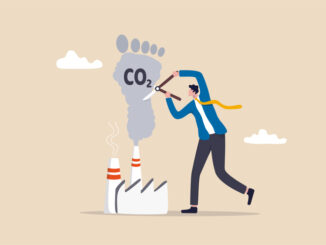
Zoe Williams discusses a recent poll which has shown that young people are justifiably anxious about the future of the planet – but also hopeful
CREDIT: This is an edited version of an article that originally appeared on The Guardian
There was a rare nugget of hope in the assorted news and polling on the climate crisis last week; 18-to-24-year-olds in Britain are the most optimistic that the planet is still salvageable, with 73% agreeing with the statement presented by YouGov, ‘We are still able to avoid the worst effects of climate change, but it would need a drastic change in the steps taken to tackle it, and fast’. Only two-thirds of older cohorts held the same view.
Young people’s positive outlook stands in contrast to the actual state of the environment, to which they are extremely attuned; sure enough, the under-30s are much more worried about the climate than any other generation. While, overall, the differences don’t look stark – three-quarters of the young versus two-thirds of those over 65 fall under the umbrella term ‘worried’ – twice as many young people as any other cohort described themselves as ‘very worried’. We should note one quirk of the fieldwork; ‘very’ was the strongest word in the poll. Who knows what depths of anxiety would have been uncovered if the poll had included ‘extremely worried’ or ‘climbing the wall’? This generation, lacking a retiree’s capacity for denial, has the clearest sense of what its crisis-ridden future might look like, so these young people have to believe that environmental collapse can be averted – the alternative is despair.
It ought to continually surprise us to see very young teenagers engaging in direct climate action, such as school strikes across the globe, and even younger children trying to change their diets to minimise their carbon footprints; political awakenings now happen earlier and earlier. This is not an accident, or a consequence of ‘wokeness’; these anxieties are the unremarkable result of education, of curricula that diligently scope anthropogenic climate crisis and chart its course.
Climate catastrophe
It was only during lockdown that I got a sense of how powerfully dominant in education is the drumbeat of climate catastrophe. I call it ‘homeschooling’ but, realistically, with 12 and 13-year-olds, it was more a case of having their live lessons on in the background while I tried to concentrate on more important things, like whom to believe, Meghan Markle or Prince Charles. It was not unusual for them to have four consecutive classes that were about the environment; a geography lesson on the crisis in the oceans, design technology on the devastating life-cycle of the plastic bag, a science lesson on the feedback loops that accelerate CO2 emissions and, finally, some post-apocalyptic literature in English.
This, unsurprisingly – and I suppose we have to tip our hats to the emotional impact of a global pandemic at the same time – caused a lot of anxiety, to the extent that I started writing a book, just for my son, on why we weren’t necessarily doomed.
I sought 10 reasons for optimism – and found five. First, it may look as though the adult world is incapable of action, and technically we have known about carbon emissions for decades, but the consensus on fighting climate breakdown is relatively recent, and this era of global political will is quite new. Even if you look back to 2009, and the frustrated outcome of the Copenhagen COP summit, you can see how different the context was when nations weren’t in accord on the nature and urgency of the challenge.
Second, there is a huge amount that we now know; how to end fossil fuel dependency, how to build houses carbon neutrally and live carbon-neutral lives in them, how to rewild landscapes and greenify deserts, how to harness the power of the sun and wind. Discovery was the slow bit; enactment will be faster.
Third, look at the modelling of the geophysicist Brad Werner, described in Ann Pettifor’s Case for a Green New Deal. Analysing resource depletion across the world, Werner concluded that, in an unrestrained capitalist system, such actions were ‘so rapid, convenient and barrier-free that ‘earth-human systems’ were becoming dangerously unstable in response’. Yet there was one source of potential interruption; mass resistance movements. Extinction Rebellion, student climate strikes – we notice these things because they make the news for disrupting traffic – but they are also among the few factors that shake up the modelling that otherwise points to accelerating environmental degradation.
A great improvement
Fourth, if you look at action on climate change as restriction, a necessary curtailment that will deplete our quality of life, like a diet, then it does start to look rather unlikely. Yet if you look at it instead as something that will improve our lives greatly, both directly (in the liberation from the worst consequences of the climate crisis) and indirectly (in the greater equality that a different distribution of resources will inevitably bring about) then it all starts to look more practical and probable.
Fifth, you can say what you like about politicians and billionaires, about boomers and the inept Generation X, but one thing is true of all of us; we don’t want our children to perish, or theirs for that matter, and this ought to be our guiding principle, obliterating all other concerns.
I want to say these notions changed the mood of the household, but I was missing the point. If kids are going to be presented with the facts of the climate crisis, as they must be, this cannot be counteracted with loving boosterism. You need to teach them how to harness and act on their own political power. You need to teach them how to build those resistance movements that are all that’s standing between us and Earth’s galloping instability. You cannot educate a generation on the dangers posed to them without giving them the political tools to respond.
The education secretary who periodically pledged to ‘depoliticise’ the curriculum has now been sacked, but that’s probably not the end of silly, attention-seeking, skirmishes in a confected culture war.
The urgent, meaningful work is to politicise the curriculum.



Be the first to comment